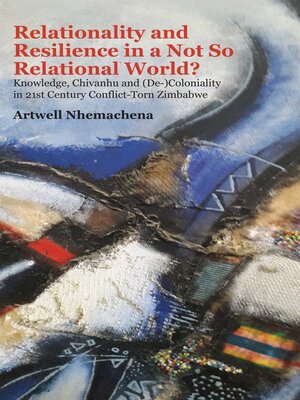Relationality and Resilience in a Not So
ebook ∣ Knowledge, Chivanhu and (De-)Coloniality in 21st Century Conflict-Torn Zimbabwe
By Artwell Nhemachena

Sign up to save your library
With an OverDrive account, you can save your favorite libraries for at-a-glance information about availability. Find out more about OverDrive accounts.
Find this title in Libby, the library reading app by OverDrive.



Search for a digital library with this title
Title found at these libraries:
| Library Name | Distance |
|---|---|
| Loading... |
This book critically examines the relevance of the increasingly popular theories on relationality by interfacing those theories with the African [Shona] modes of engagement known as chivanhu [often erroneously narrowly translated as tradition]. In other words, the book takes seriously concerns by African scholars that much of the theories that have been applied in Africa do not speak to relevance and faithfulness to the continent. Situated in a recent Zimbabwean context marked by multiple crises producing multiple forms of violence and want, the book examines the relevance of relational ontologies and epistemologies to the everyday life modes of engagements by villagers in a selected district. The book unflinchingly surfaces the strengths and weaknesses of popular theories while at the same time underlining the exigencies of theorising from Africa using African data as the millstones. By meticulously and painstakingly unpacking pertinent issues, the book provides unparalleled intellectual grit for the contemporary and increasingly popular discourses on (de-)coloniality and resilience in relation to the African peoples and their [often deliberately contested] environments, past, present and future. In other words, the book loudly sounds the bells for the battles to decolonise and transform Africa on Africa�s own terms. This is a book that would be extremely useful to scholars, activists, theorists, policy makers and implementers as well as researchers interested not only in Africa�s future trajectory but also in the simultaneities of temporalities and worlds that were sadly overshadowed by colonial epistemologies and ontologies for the past centuries.







